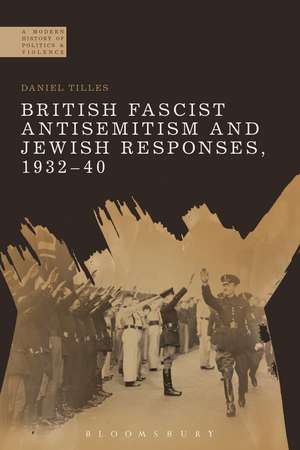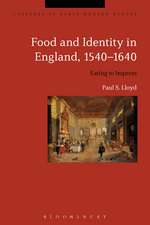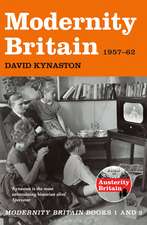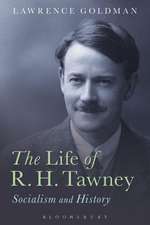British Fascist Antisemitism and Jewish Responses, 1932-40: A Modern History of Politics and Violence
Autor Dr Daniel Tillesen Limba Engleză Paperback – 18 mai 2016
| Toate formatele și edițiile | Preț | Express |
|---|---|---|
| Paperback (1) | 258.04 lei 6-8 săpt. | |
| Bloomsbury Publishing – 18 mai 2016 | 258.04 lei 6-8 săpt. | |
| Hardback (1) | 774.20 lei 6-8 săpt. | |
| Bloomsbury Publishing – 19 noi 2014 | 774.20 lei 6-8 săpt. |
Preț: 258.04 lei
Preț vechi: 331.46 lei
-22% Nou
Puncte Express: 387
Preț estimativ în valută:
49.38€ • 51.68$ • 41.10£
49.38€ • 51.68$ • 41.10£
Carte tipărită la comandă
Livrare economică 31 martie-14 aprilie
Preluare comenzi: 021 569.72.76
Specificații
ISBN-13: 9781474286428
ISBN-10: 1474286429
Pagini: 272
Ilustrații: 6 illus
Dimensiuni: 156 x 234 x 22 mm
Greutate: 0.39 kg
Ediția:NIPPOD
Editura: Bloomsbury Publishing
Colecția Bloomsbury Academic
Seria A Modern History of Politics and Violence
Locul publicării:London, United Kingdom
ISBN-10: 1474286429
Pagini: 272
Ilustrații: 6 illus
Dimensiuni: 156 x 234 x 22 mm
Greutate: 0.39 kg
Ediția:NIPPOD
Editura: Bloomsbury Publishing
Colecția Bloomsbury Academic
Seria A Modern History of Politics and Violence
Locul publicării:London, United Kingdom
Caracteristici
Offers fresh insight into a key and controversial British political figure, Sir Oswald Mosley
Notă biografică
Daniel Tilles is Assistant Professor of History at the Pedagogical University of Cracow, Poland. He is the co-editor, along with Salvatore Garau, of Fascism and the Jews: Italy and Britain (2011).
Cuprins
Introduction1. Fascism and Anti-Fascism in 1930s Britain2. The Evolution of Anti-Jewish Discourse3. Cleansing the Nation: Antisemitism and Ideology4. Mosley, Fascism and Antisemitism5. Early Jewish Responses to the BUF, 1932-56. The Defence Debate, 19367. Communal Convergence, 1937-40ConclusionBibliographyIndex
Recenzii
Self-assured and clearly in command of his material, Tilles offers a compelling account of the development of both the BUF's antisemitism and the variegated response to it by Anglo-Jewry ... The author achieves something rather splendid: he really does breathe new life into this 'exhausted' subject ... This is a tightly defined, in-depth, cogent and assertive study. Without doubt, it re-energizes the field.
Tilles has taken our breath away with a thoroughly researched investigation that challenges much received wisdom concerning this most sensitive subject. Using new material as well as reinterpreting well-thumbed existing accounts, he offers us a provocative but at the same time compelling re-telling of the narrative.
Daniel Tilles has produced the most detailed and nuanced account of the British Union of Fascists' antisemitism and Jewish responses to it. Utilising new sources and re-assessing old ones, he provides a thought-provoking analysis of the nature of BUF antisemitism, including that of its leader, Oswald Mosley. Tilles also shows the complex and, he argues, successful Jewish actions against the vile attacks of Britain's largest fascist movement during the 1930s.
This book brings a breath of fresh air to the study of the British Union of Fascists and of Jewish responses to the threat it posed. In clear, forceful prose, Daniel Tilles demolishes two long-standing interpretations: that the BUF embraced antisemitism belatedly and only after Jews disrupted their meetings, and that the response of the Jewish communal elite was timid by comparison with the militant response of Jewish workers and Communists. His argument, which draws in large part on hitherto unavailable archival materials, is compelling and has far reaching implications.
Painstakingly-researched addition to this field.
Tilles has taken our breath away with a thoroughly researched investigation that challenges much received wisdom concerning this most sensitive subject. Using new material as well as reinterpreting well-thumbed existing accounts, he offers us a provocative but at the same time compelling re-telling of the narrative.
Daniel Tilles has produced the most detailed and nuanced account of the British Union of Fascists' antisemitism and Jewish responses to it. Utilising new sources and re-assessing old ones, he provides a thought-provoking analysis of the nature of BUF antisemitism, including that of its leader, Oswald Mosley. Tilles also shows the complex and, he argues, successful Jewish actions against the vile attacks of Britain's largest fascist movement during the 1930s.
This book brings a breath of fresh air to the study of the British Union of Fascists and of Jewish responses to the threat it posed. In clear, forceful prose, Daniel Tilles demolishes two long-standing interpretations: that the BUF embraced antisemitism belatedly and only after Jews disrupted their meetings, and that the response of the Jewish communal elite was timid by comparison with the militant response of Jewish workers and Communists. His argument, which draws in large part on hitherto unavailable archival materials, is compelling and has far reaching implications.
Painstakingly-researched addition to this field.






























